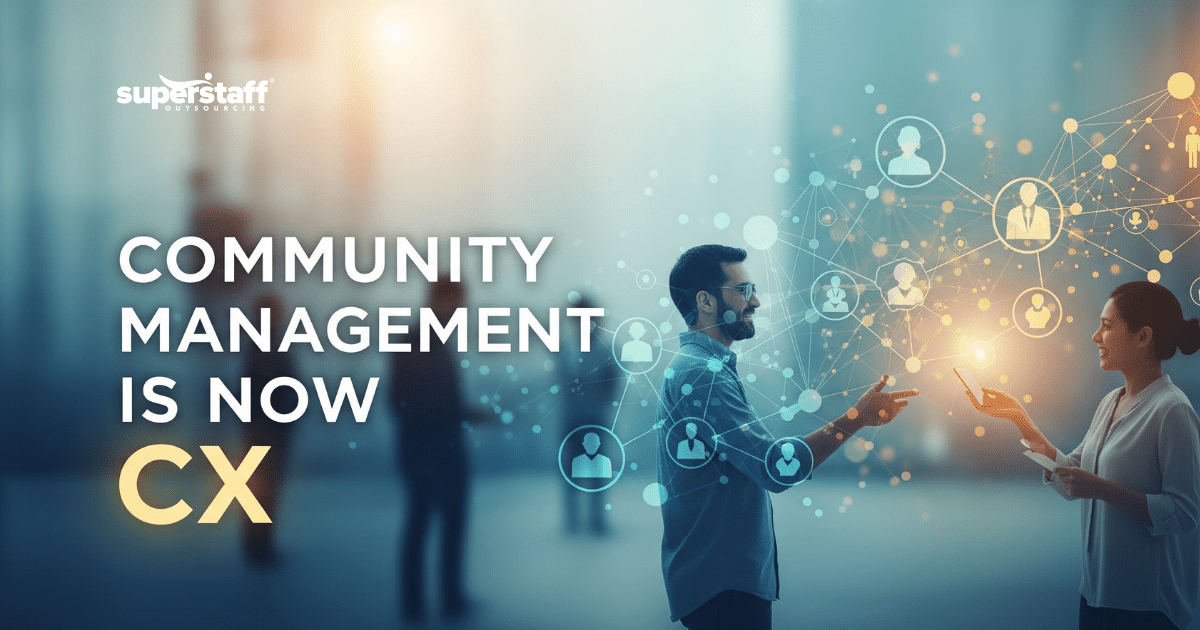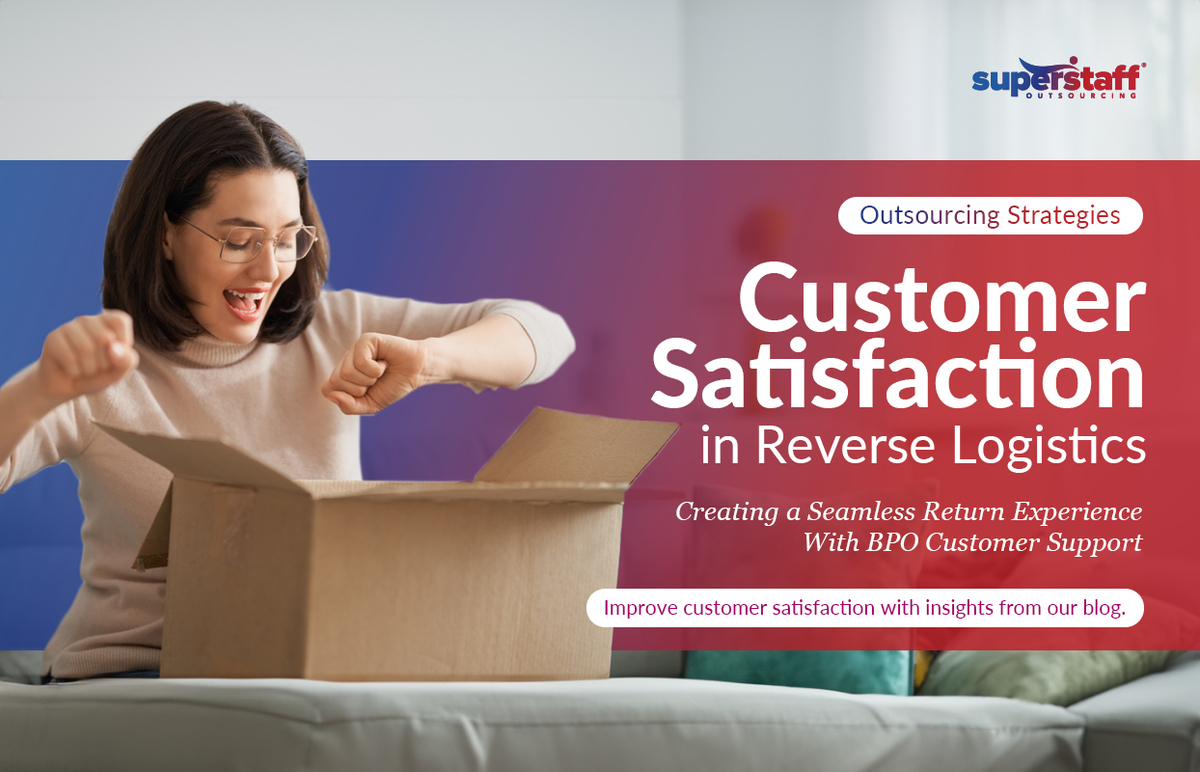
In the competitive landscape of modern commerce, customer satisfaction hinges not only on product quality but also on the ease and efficiency of returns. To win the hearts and minds of your consumer base, you must invest in and optimize your returns and exchange processes, giving them the speed and convenience they expect from your business.
As a reverse logistics firm, you manage the quick and efficient return of various goods and products. Believe it or not, your job is critical in shaping customer experiences and helping brands keep buyers happy and satisfied.
To help you develop and execute a seamless return process, we’ll discuss customer expectations in reverse logistics and the role of business process outsourcing (BPO) in enhancing your operations and boosting client satisfaction.
We’ll also highlight the strategies and best practices for employing BPO customer support and outsourcing solutions to improve reverse logistics and customer satisfaction metrics.
Understanding Customer Expectations in Reverse Logistics
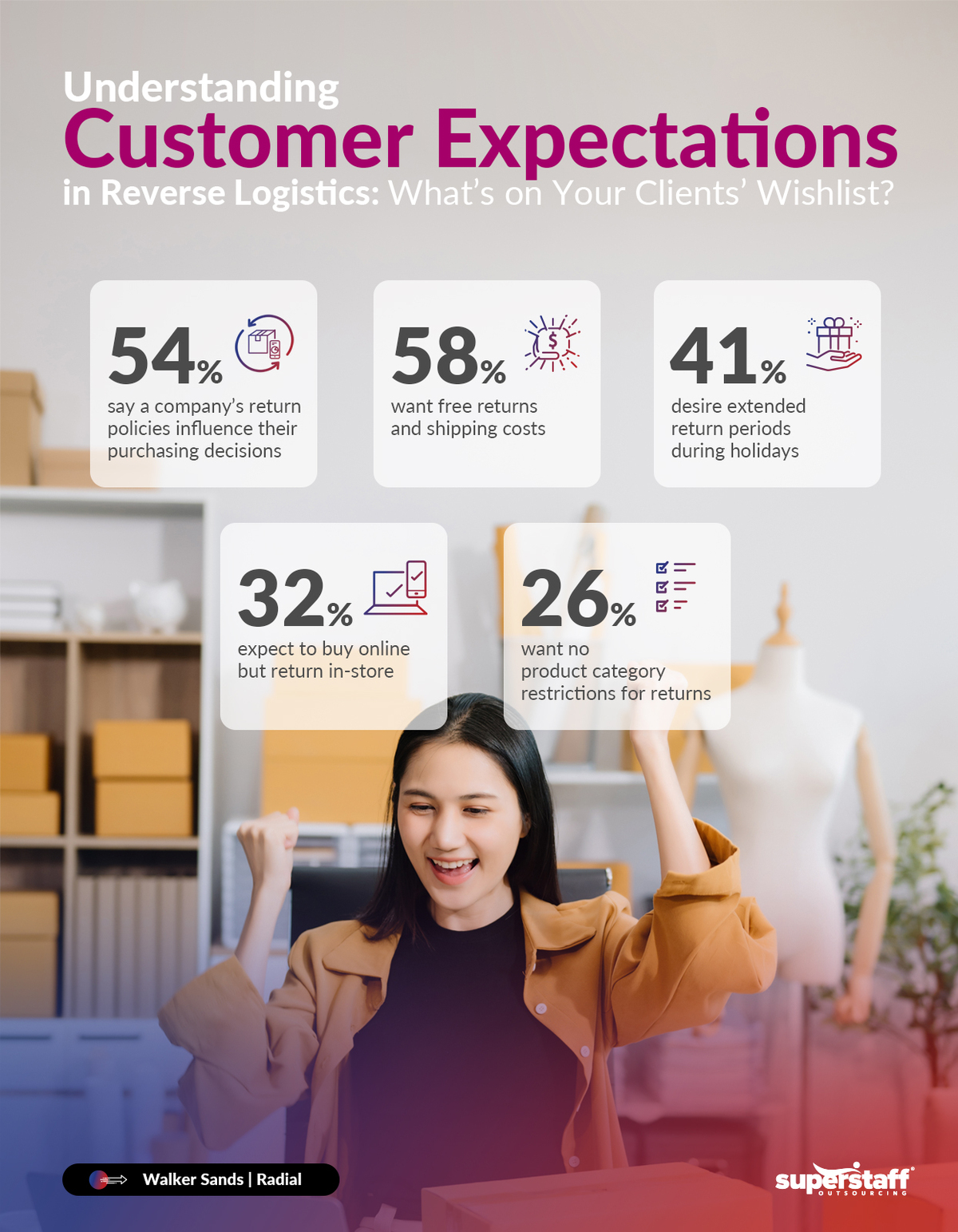
Customer expectations have evolved in the modern age, with everyone now demanding convenience, transparency, and speed in every transaction—and the returns and exchange process is no exception. When buyers ask to return, refund, or exchange an item, they expect a quick, hassle-free, and seamless experience.
According to a Walker Sands Future of Retail Report, 54% of buyers say return and exchange policies impact their decision to engage with and do business with a brand. If customers don’t like your reverse logistics processes, they may stop purchasing from you altogether and switch to your competitor instead.
The most common reasons for returning products include:
- Returning damaged or defective items (56%)
- Not liking the item (44%)
- Thinking the item did not match the product description (31%)
- Finding a better deal (13%)
- Experiencing buyer’s remorse (11%)
- Making an incorrect order (11%)
So, what exactly do they expect from you? A 2023 Radial Peak Consumer survey highlights that buyers want companies to offer free returns and shipping costs (58%), extend return periods during holiday seasons (41%), give the ability to buy online and return in-store (32%), and cut down on return restrictions based on product categories (26%).
Investing in customer-centric return policies like these can give your business a competitive edge in the tight global marketplace. Making it easier for consumers to purchase and return products will make them more likely to stay loyal to your brand and even recommend you to their friends and loved ones.
Real-Life Example: Costco
To illustrate the importance of returns and exchange processes in a company’s success, let’s study Costco, a big box retail chain known for its flexible and generous return policies.
In most stores, customers are expected to show receipts when returning a product. Meanwhile, Costco allows members to refund or exchange unwanted items even without it. All buyers need is to present their membership ID number, and Costco will quickly and efficiently issue a refund through cash or credit.
Employing a “Satisfaction Guarantee” to all items they sell, Costco does not have a specific time frame for returns. Aside from electronics and major appliances, most items can be returned anytime. For instance, if you shop for new clothes in January but decide they aren’t to your taste, you can return them even in July, as long as you haven’t removed the tags.
What if you bought a cake from Costco, ate a slice, and realized the taste was off? Yes, Costco even allows returns for perishable or partially eaten food items if you bring back at least 50% of it.
Because of these customer-centered return policies and easy processes, Costco has become one of the most prominent and successful brands globally. As the world’s third largest retailer, Costco has reaped a brand value of $60.5 billion and a net income of $6.3 billion worldwide. Despite having fewer stores than its main competitors, the retailer earned the highest average sales volume per store at $286 million.
Potential Markets for Reverse Logistics Firms
According to Statista’s research, companies spent over $363 billion on return delivery costs in North America over the past five years. Meanwhile, global return costs reached over $1 trillion in the same period. These figures highlight the growing demand for efficient reverse logistics. Almost all businesses need these services, but some sectors may benefit more than others.
Reverse logistics services are crucial for several industries, particularly those with significant product returns, refurbishing needs, or stringent disposal regulations. With the right processes, these industries can manage returns efficiently, reduce costs, ensure compliance with regulations, and minimize environmental impact.
Retail and E-Commerce
A 2023 National Retail Federation study found that the average return rate for e-commerce was 17.6%, meaning that nearly 18 out of every 100 products sold are returned. Over the past year, $247 billion worth of merchandise bought online was returned to the retailer. For brick-and-mortar stores, the average rate reached 10.02%, creating $371 billion worth of returns.
With the rising volume of returns, retail and e-commerce businesses cannot afford to overlook reverse logistics when mapping out their end-to-end order fulfillment processes. Whether selling clothing, home appliances, or furniture, retailers employ firms like yours for efficient return management, restocking, and refurbishing, which all work together to create a quicker and more efficient return experience for buyers.
Electronics and Technology
Product returns are a massive pain point for many consumer electronics companies. Research studies have found that 41% of customers admit to returning electronic products even when they aren’t damaged or defective. The main reasons are that they find the device hard to operate (67%) and challenging to install (52%).
These high return rates often cost consumer electronics companies a fortune, especially since complex products require specialized reverse logistics for refurbishing, recycling, and disposing of electronic waste.
Automotive Manufacturing
Customers typically cannot return a newly purchased car, but there are specific circumstances where an automotive business may be legally obligated to give a refund. For instance, vehicles with major mechanical failures that cannot be easily repaired may be eligible for returns, with most manufacturers and dealerships employing a 30-day return window.
In these cases, automotive companies may need to hire your reverse logistics firm to help them recover the vehicle, manage the returned parts and cores for remanufacturing, and process refunds or exchanges.
Pharmaceuticals
Unused or expired drugs can often be sent back to pharmaceutical companies, but they typically have strict return policies and disposal regulations. Pharma businesses can work with your reverse logistics firm to either return the products to manufacturers for credit and restocking or treat them as hazardous waste and dispose of them in compliance with applicable laws.
Medical Devices
Healthcare technology companies create products that help improve the lives of millions of patients worldwide. These devices and equipment help people monitor their health, manage illnesses, and share data with their providers.
However, if the medical products are damaged or don’t function as intended, customers can send back their purchased items. Reverse logistics firms like yours can then handle the return and refurbishment of these items and manage disposal for single-use products.
Food and Beverage
Customers can return food items with quality issues, unopened perishable goods, and recalled products. With the assistance of reverse logistics firms, food manufacturers can safely handle returned products and dispose of them in compliance with industry regulations.
Challenges in Managing Reverse Logistics Without Business Process Outsourcing
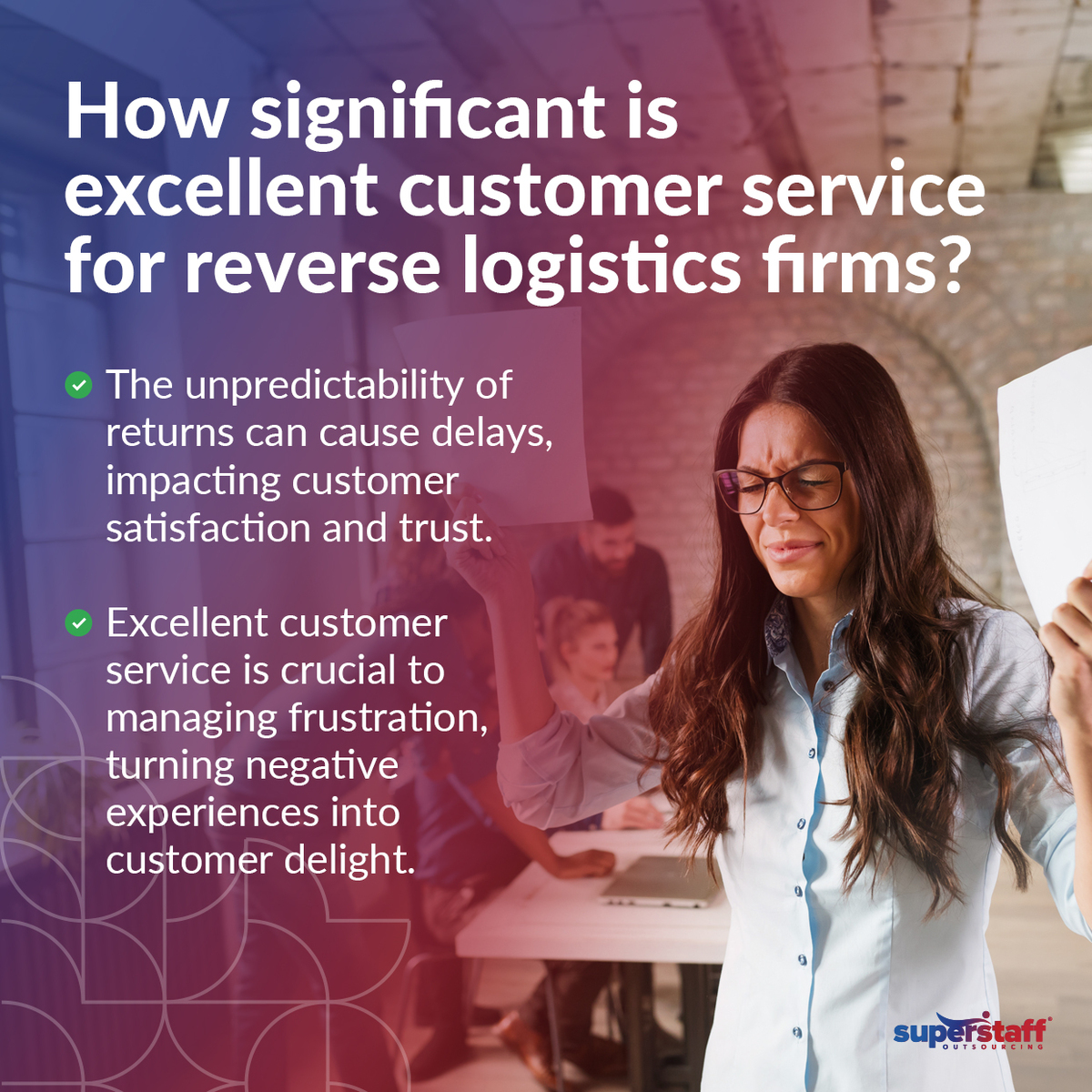
Having discussed what customers expect when making returns, let’s talk about the everyday challenges firms like yours may face that keep you from meeting your client’s expectations. Internal challenges often hinder seamless return experiences and affect overall customer satisfaction. Here are the common pitfalls in reverse logistics and how outsourcing can help you address them:
Complexity of Returns
The hard truth is that effective reverse logistics is a complex process with several time-intensive steps. It starts with processing and inspecting the returned item. Depending on the item’s state (or the nature of the industry), you’ll need to repair, restock, recycle, or dispose of it. Then, you either repackage and send back the product, refund the customer, or allow them to exchange it for a brand-new item.
Because there are so many actions and steps, you may struggle to monitor orders, keep track of inventory, and manage the logistics of sending and receiving products. Thankfully, leveraging business process outsourcing services can help you streamline your processes and stay on the right track. These outsourced professionals can support your operations by handling logistics, inventory management, quality control, and other crucial back office functions.
Cost Implications
Another challenge reverse logistics firms like yours face is the significantly high cost of handling returns. Some expenses include transportation, inspections, processing fees, repairs, discount and liquidation loss, and redelivery costs. All of these combined can cost up to 59% of the item’s sales price, potentially costing you more than the initial purchase.
If you keep your entire operations in-house, you’ll also have to pay more for wages, benefits packages, recruitment, employee training, and onboarding. You’ll also have to rent office spaces for your in-house workers, adding utilities, infrastructure, and equipment costs.
By delegating BPO customer support and other outsourced services to a reliable provider, you can reduce these costs by a significant margin. Outsourcing firms leverage economies of scale and allow you to tap into a broader global talent pool with more cost-effective labor and living costs. This way, you can save money and resources while knowing that offshore specialists support your core operations.
Impact on Operational Efficiency
Finally, operational inefficiencies are another pitfall plaguing many reverse logistics firms. When dealing with a high volume of returns, you may find it difficult to keep track of all the products while dealing with bottlenecks in your supply chain or transportation disruptions.
Working with a business process outsourcing team can help you optimize and improve transparency across each step of your operations. While you focus on your core activities, BPO specialists can take on administrative and support tasks to lighten your workload while enhancing productivity and performance.
The Role of BPO Customer Support and Other Solutions in Enhancing Reverse Logistics and Buyer Satisfaction
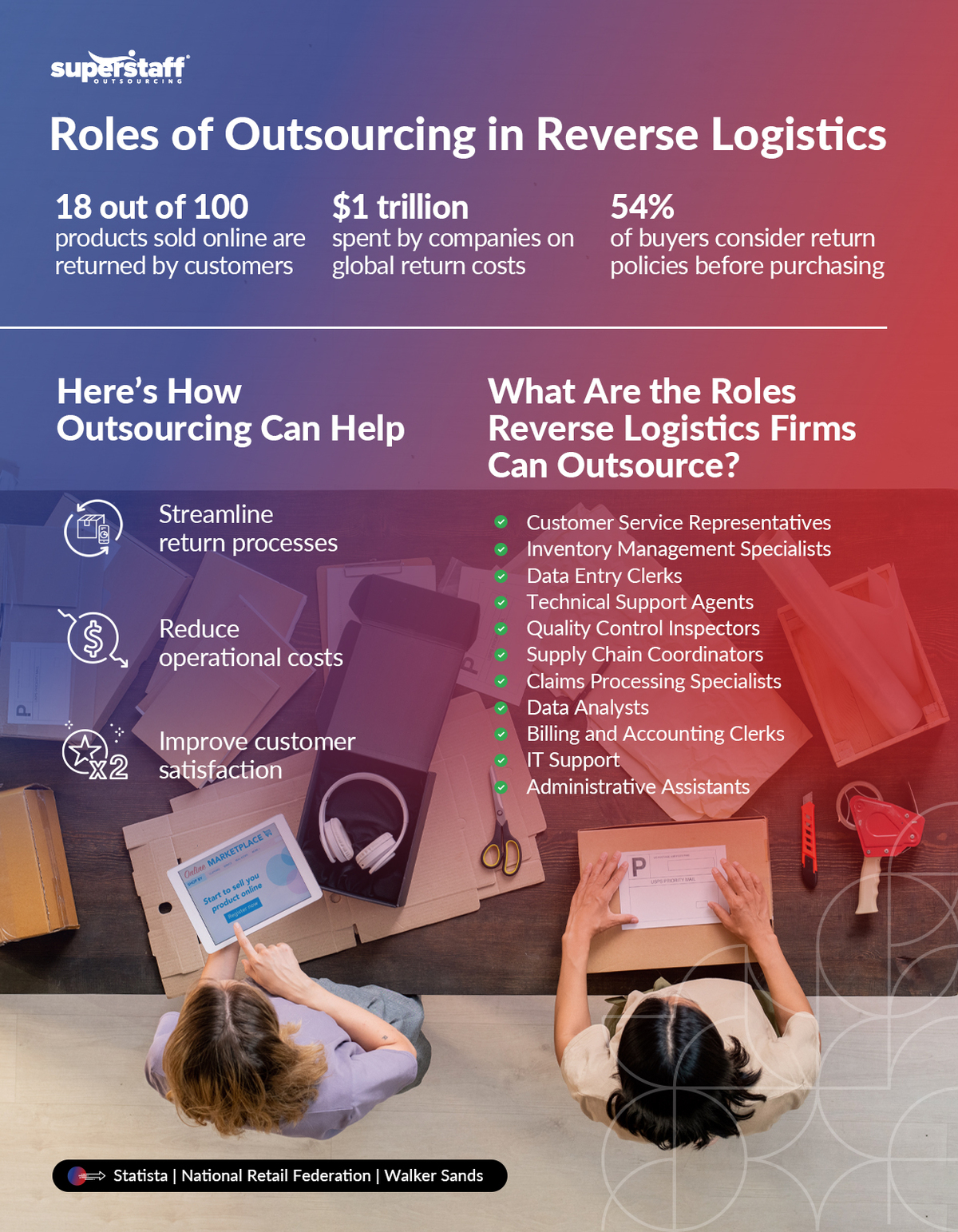
To address the challenges mentioned above, reverse logistics firms like yours can collaborate with a dedicated BPO team. Outsourcing providers offer strategic solutions to streamline your reverse logistics operations, enhance efficiency, and improve customer satisfaction metrics. Some of the roles you can outsource include:
Customer Service Representatives
When buyers encounter a problem with your product, they’ll contact your customer service department for help. Your outsourced customer support team will respond to inquiries, guide customers through the returns and exchange process, and help resolve issues with defective products.
Customers don’t want to be kept in the dark about the status of their exchanges or redeliveries. So, your CS representatives will also have to proactively provide support, immediately notifying your buyers about delays, cancellations, or other unexpected issues with their returns.
Inventory Management Specialists
Once a customer contacts you about returning a product, you must work with inventory management specialists to ensure you can supply an item in exchange. These outsourced professionals are responsible for tracking inventory levels, monitoring returned or exchanged products, and overseeing the restocking or disposal procedures.
Data Entry Clerks
All customer transactions, whether initial orders or returns, must be properly recorded and logged in your database. By outsourcing data entry to offshore professionals, you can ensure that all information and documentation related to returns, inventory, order tracking, and customer profiles will be updated accurately and efficiently.
Technical Support Agents
Sometimes, returns can be prevented simply by guiding customers through technical issues. In previous sections, we’ve mentioned that buyers return consumer electronics devices because they find them challenging and frustrating to use.
Your technical support and help desk team can answer technical questions, provide troubleshooting support, and assist customers in resolving complex problems. However, if the technical issue still cannot be resolved, they will help customers return or exchange their purchases.
Quality Control Inspectors
One benefit of hiring a business process outsourcing provider is having an extra set of eyes to help you maintain quality control. These offshore and nearshore specialists perform quality checks and inspections of all returned products. They will determine the item’s condition and help you decide on the next steps (for instance, some products can be repaired and sold at a discounted price, some can be recycled, while others are disposed of).
Supply Chain Coordinators
Proper reverse logistics requires thorough coordination between all stakeholders involved in your supply chain. Hiring an outsourced team to coordinate with suppliers, manufacturers, and logistics partners can help you manage the flow of returned goods, ensure efficient processing, and create seamless customer experiences.
Claims Processing Specialists
All logistics operations face operational risks and challenges, from supply chain disruptions to unexpected weather disturbances and transportation accidents. Insurance claims processing specialists can manage warranty claims and other insurance tasks related to returned or damaged goods.
For example, if someone orders a medical device, the claims specialist will help verify the patient’s insurance coverage so they won’t have to pay out-of-pocket for their needed equipment. If the device gets damaged during transportation or because of a supplier error, the claims specialist can also help process refunds through the insurance carrier.
Data Analysts
Like all businesses, your reverse logistics firm benefits from leveraging data when making critical decisions. By working with a data analyst, you can better understand return trends (i.e., which product has been returned the most often, and what is the common problem cited by customers?). Your outsourced data specialist will identify patterns in your raw data and provide insights that can help you improve your processes and reduce return rates.
Billing and Accounting Clerks
Keeping track of all financial transactions, including returns and exchanges, is crucial to running your business. Working with outsourced accounting and billing professionals will allow you to create and send invoices, monitor all the costs related to the return process, handle billing discrepancies, and manage your overall financial health.
IT Support Team
As a reverse logistics business, you likely rely on many technologies to oversee order tracking, transportation, and other parts of your supply chain. Having a dedicated outsourced IT support team will help you maintain and support your tech infrastructure, ensuring the security and reliability of your software, systems, and databases.
Administrative Assistants
Finally, as mentioned in previous sections, reverse logistics involves many moving parts and actions, which can become overwhelming for your team to handle alone. Working with outsourced administrative assistants can lighten their workload.
As your in-house workers focus on your main revenue-driving activities, these offshore professionals can provide general administrative support, including scheduling, documentation, and communication with various stakeholders involved in the reverse logistics process. Outsourcing these roles lets you focus on your core competencies while benefiting from a BPO provider’s specialized skills and cost efficiencies.
Strategies for Integrating BPO Support in Reverse Logistics
Now that you know the roles you can delegate to a business process outsourcing partner, let’s discuss practical steps and strategies for leveraging BPO support. Here are the best practices you should know to make the most out of your outsourcing arrangement:
#1: Identify your needs.
Before committing to any BPO provider, ensure you know exactly what you need. Break down your operations and assess which areas would most benefit from being outsourced or which can be supported by an offshore team.
Do you need help with BPO customer support or administrative functions? How about more specialized solutions like data science? Identifying the particular solutions you need can help you maximize your partnership through strategic planning and targeted operational support.
#2: Select a BPO partner that can fill the gaps in your operations.
Once you’ve identified your needs, search for an outsourcing vendor who can meet them. For example, you’ve noticed bottlenecks in your supply chain and want to partner with a BPO for logistics support and dispatching services. Make sure the outsourcing company you partner with has experience with the reverse logistics sector and can help you comply with industry laws and regulations.
Here are the key considerations you need to take into account when selecting a BPO partner for your reverse logistics firm:
- Available Solutions: Do they offer the outsourcing services you need for your company?
- Talent Pool: Do they have access to a qualified workforce who can meet your requirements?
- Industry Experience: Have they worked with other reverse logistics firms?
- Tech Infrastructure: Do they have the software and systems to support your operations?
- Location: Will your operations benefit from being offshored or nearshored (or a blend of both)?
#3: Establish a Service Level Agreement (SLA).
To ensure that you and your BPO partner are aligned in your goals and objectives, establish a clear and comprehensive Service Level Agreement. Your SLA should include all terms and conditions of your agreement, including the scope of the project, the duties and responsibilities of your outsourcing partner, and your mutually agreed upon expectations.
Make sure to also discuss these key points when negotiating your outsourcing contract:
- Pricing and Payment Terms: Request a transparent breakdown of costs for each solution and set clear terms for the mode and frequency of payment.
- Data Privacy and Security Standards: Ensure your BPO vendor complies with international standards in cybersecurity so you can safeguard your valuable data and information.
- Quality Expectations: Be clear about the quality of work you expect from your outsourced team.
- Termination Clauses: Make sure both parties understand and agree on the particular conditions and terms that would warrant termination of your partnership (for example, if quality standards are not met or projects are not completed within a specific timeframe, your firm can cease outsourced operations).
#4: Set key performance indicators (KPIs) for your outsourcing team.
Trust is vital for any partnership, but measuring and verifying your BPO vendor’s performance is essential to ensure they meet your agreed-upon expectations. The best way to do this is by setting KPIs as early as the negotiation stage.
Here are just a few examples of reverse logistics metrics you can use to assess whether your outsourcing team is boosting your operational efficiency and performance:
- Return Rates: Out of all products sold, what is the percentage of items returned to your company?
- Return Processing Times: How long does your team take to receive, process, inspect, sort, and dispose of a returned product?
- Return Processing Costs: How much does it cost your firm to transport, handle, and dispose of a returned item?
- Return Value: What is the amount of revenue or savings you reaped from a returned product?
#5: Practice regular communication and reporting.
Finally, the key to a successful outsourcing relationship is regular communication. A comprehensive communication and reporting plan can help you align expectations and avoid misunderstandings throughout your partnership. Here’s what you should discuss with your BPO vendor:
- Communication Channels: Which platforms will you use for synchronous and asynchronous communication? For example, formal requests and reports can be emailed, but urgent questions can be sent through Skype or Slack.
- Communication Frequency: How often do you expect updates on your team’s progress? For instance, some firms may provide monthly reports, while others expect progress updates every two weeks.
- Feedback Mechanisms: What are the ways your outsourcing partner can send you feedback? Remember that a partnership is a two-way street. Your BPO vendor may sometimes need to pivot strategies after encountering unexpected problems or disruptions. Make sure they can send you feedback so you can enjoy a smoother, hassle-free outsourcing relationship.
Adopting these strategies can help firms like yours optimize reverse logistics processes and exceed customer expectations. Following these best practices can also help you find your ideal BPO partner and create a lasting and mutually beneficial partnership.
Rely on SuperStaff for Comprehensive Business Process Outsourcing Services
From understanding customer expectations to overcoming internal challenges and leveraging BPO strategies, enhancing reverse logistics benefits both firms and their customers. To improve your operational efficiency and elevate buyer satisfaction, partner with SuperStaff for comprehensive BPO customer support and other outsourcing solutions.
Our professional team can work closely with you to create a customizable and scalable outsourcing strategy that meets your needs. Count on us to help you transform your return processes and drive business growth in a competitive marketplace.

